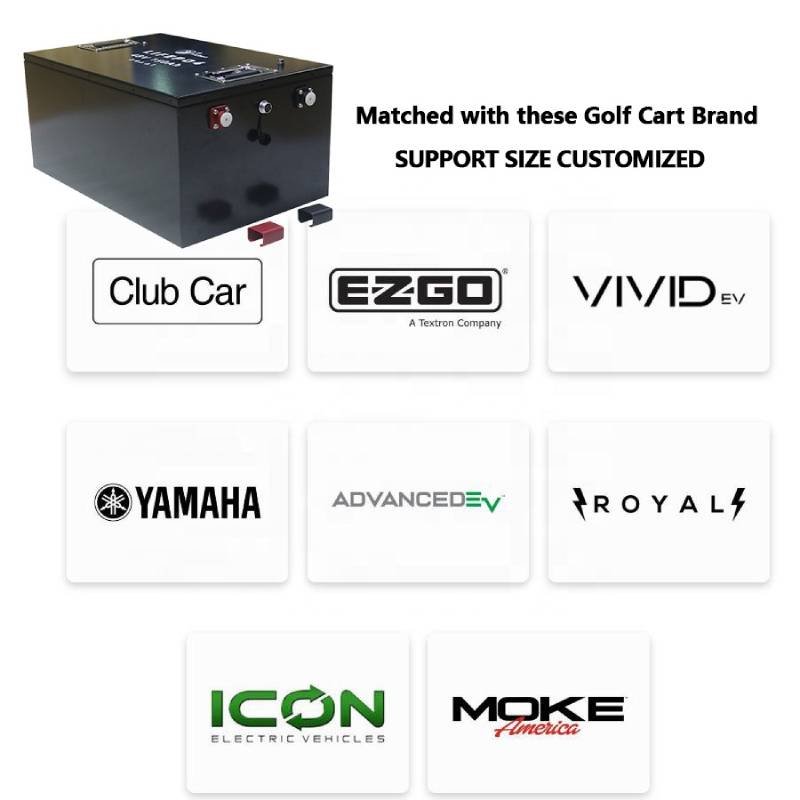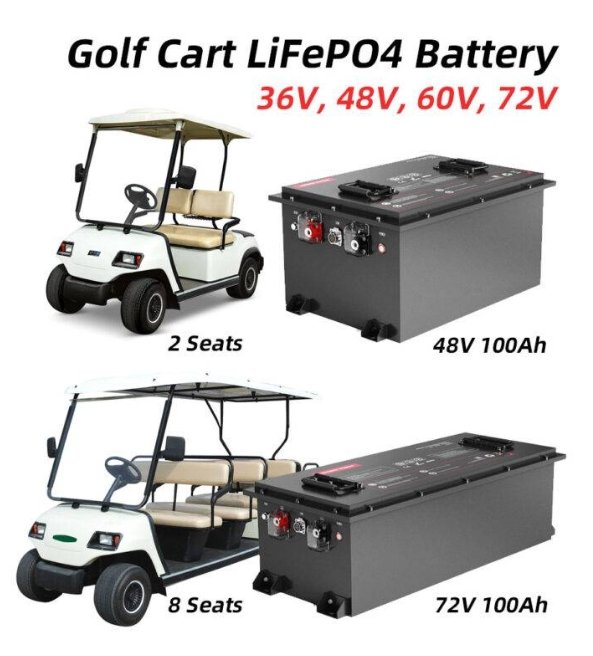Lithium batteries have revolutionized the way we power our vehicles, including golf carts. The 60V lithium battery, in particular, has become a popular choice due to its efficiency, longevity, and environmental benefits. However, several factors can influence the performance of these batteries. In this article, we will explore the key factors that affect the performance of a 60V golf cart lithium battery, provided by NEWILLING, a leading lithium battery manufacturer.
Battery Chemistry
The chemistry of a lithium battery plays a crucial role in its performance. Different lithium battery chemistries, such as Lithium Iron Phosphate (LiFePO4), Lithium Cobalt Oxide (LiCoO2), and Lithium Nickel Manganese Cobalt Oxide (NMC), have varying characteristics in terms of energy density, lifespan, and safety. For golf carts, LiFePO4 is often preferred due to its stability, long cycle life, and safety features.
60v 210ah battery for tour lsv golf cart deep cycle
48v lithium golf cart battery 51 2v 105ah battery
48v 51 2v 16s golf cart lithium battery nw 0016 oem
51 2v 150ah large curent lithium golf cart batteries supplier
72v 230ah lithium battery for hotel golf cart

Energy Density
Energy density refers to the amount of energy stored in a battery relative to its weight or volume. Higher energy density means more power can be stored in a smaller space, which is crucial for golf carts that need to balance weight and performance. LiFePO4 batteries, while having lower energy density compared to other lithium chemistries, offer excellent safety and longevity, making them a balanced choice for golf carts.
Temperature Management
Temperature is a critical factor that affects the performance and lifespan of lithium batteries. Extreme temperatures, both hot and cold, can degrade battery performance and reduce its lifespan. NEWILLING’s 60V lithium batteries are designed with advanced thermal management systems to maintain optimal operating temperatures, ensuring consistent performance and longevity.
Operating Temperature Range
Maintaining the battery within its optimal operating temperature range is essential for maximizing performance. For LiFePO4 batteries, the ideal operating temperature range is typically between -20°C to 60°C. Operating outside this range can cause reduced efficiency, increased internal resistance, and potential safety hazards.
Battery Management System (BMS)
A Battery Management System (BMS) is an integral part of modern lithium batteries. It monitors and manages the battery’s state of charge, state of health, and other critical parameters to ensure safe and efficient operation. NEWILLING’s 60V lithium batteries come equipped with advanced BMS technology to protect against overcharging, over-discharging, short circuits, and thermal runaway.
Overcharging and Over-discharging Protection
Overcharging and over-discharging can significantly impact the performance and lifespan of a lithium battery. The BMS in NEWILLING’s 60V lithium batteries prevents these conditions by monitoring the voltage and current levels, ensuring the battery operates within safe limits.
Charging Practices
Proper charging practices are essential for maintaining the performance and longevity of a lithium battery. Using the correct charger and following recommended charging protocols can prevent damage and extend the battery’s life. NEWILLING provides detailed charging guidelines for their 60V lithium batteries to help users optimize their charging practices.
Charging Speed
Fast charging can be convenient, but it can also generate heat and stress the battery, potentially reducing its lifespan. NEWILLING recommends a balanced approach to charging speed, ensuring that the battery is charged efficiently without compromising its longevity.
Discharge Rate
The discharge rate, or the rate at which the battery releases energy, can affect its performance and lifespan. High discharge rates can generate heat and increase internal resistance, leading to reduced efficiency and potential damage. NEWILLING’s 60V lithium batteries are designed to handle a range of discharge rates, providing reliable performance for various golf cart applications.
Continuous vs. Peak Discharge
Continuous discharge refers to the steady release of energy over time, while peak discharge involves short bursts of high energy. Understanding the difference between these discharge rates is important for optimizing battery performance. NEWILLING’s BMS technology helps manage both continuous and peak discharge rates to ensure safe and efficient operation.
Cycle Life
Cycle life refers to the number of charge and discharge cycles a battery can undergo before its capacity significantly degrades. LiFePO4 batteries are known for their long cycle life, often exceeding 2000 cycles. NEWILLING’s 60V lithium batteries are designed to maximize cycle life, providing reliable performance over an extended period.
Depth of Discharge (DoD)
The Depth of Discharge (DoD) is the percentage of the battery’s capacity that is used during each discharge cycle. Lower DoD can extend the cycle life of the battery. For example, discharging a battery to 50% DoD can result in a higher number of cycles compared to discharging it to 100% DoD. NEWILLING provides guidelines on optimal DoD to help users maximize the cycle life of their 60V lithium batteries.
Maintenance Practices
Proper maintenance is essential for ensuring the longevity and performance of a lithium battery. Regular inspections, cleaning, and adherence to recommended storage practices can prevent issues and extend the battery’s lifespan. NEWILLING offers comprehensive maintenance guidelines for their 60V lithium batteries to help users keep their batteries in optimal condition.
Storage Conditions
Storing lithium batteries in appropriate conditions can prevent degradation and extend their lifespan. NEWILLING recommends storing their 60V lithium batteries in a cool, dry place, away from direct sunlight and extreme temperatures. Additionally, maintaining a partial charge during storage can help preserve the battery’s capacity.
Environmental Factors
Environmental factors, such as humidity, vibration, and exposure to water, can impact the performance and lifespan of a lithium battery. NEWILLING’s 60V lithium batteries are designed to withstand various environmental conditions, but it is important to follow recommended usage guidelines to prevent damage and ensure reliable performance.
Humidity and Water Exposure
Excessive humidity and water exposure can lead to corrosion and damage to the battery’s internal components. NEWILLING’s 60V lithium batteries are built with protective casings and sealing to prevent moisture ingress, but users should still take precautions to avoid prolonged exposure to water and high humidity.

golf cart lithium battery manufacturer
Conclusion
In conclusion, the performance of a 60V golf cart lithium battery is influenced by various factors, including battery chemistry, temperature management, battery management systems, charging practices, discharge rates, cycle life, maintenance practices, and environmental factors. By understanding and addressing these factors, users can optimize the performance and longevity of their lithium batteries. NEWILLING, as a leading lithium battery manufacturer, provides high-quality 60V lithium batteries designed to meet the demanding needs of golf cart applications, ensuring reliable and efficient performance.
For more information on NEWILLING’s 60V lithium batteries and to explore their range of products, visit their official website or contact their customer support team for personalized assistance.

